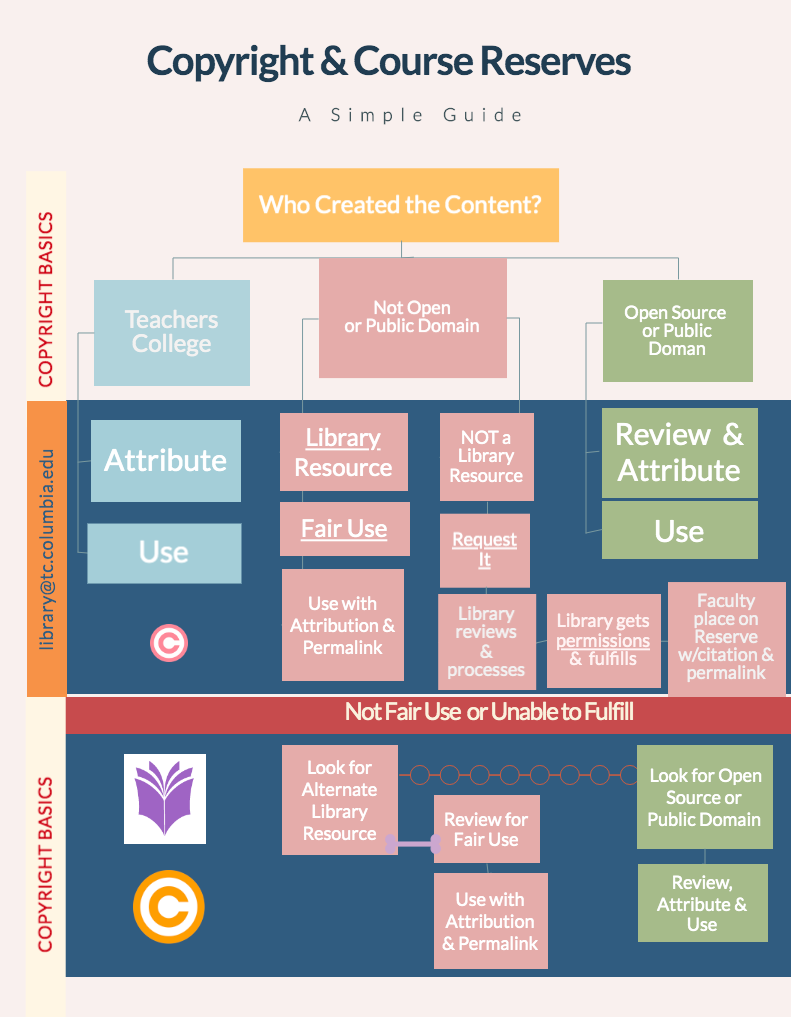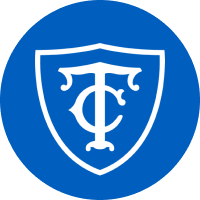Copyright
“There are all kinds of literacies—information, financial, multicultural, visual, health, political, digital, and more. Within this spectrum, copyright literacy means having the knowledge and skills to identify and manage copyright-protected materials ethically, effectively, and efficiently.”
— Linda Frederikson, Foreword, The Copyright Librarian: A Practical Handbook (2016, pp.xi-xii)
Campus Resources
Teachers College Policy Library maintains a statement on copyright, with non-library reserves copyright services further described by the Business Services Center.
Teachers College Office of General Counsel advises on copyright concerns, with an agent registered to receive complaints of copyright infringement under the Digital Millennium Copyright Act of 1998.
Copyright Basics
The Gottesman Libraries’ guidelines for providing access to copyright-protected materials are derived from the fair use provisions of the U.S. Copyright Act of 1976 (Title 17 of the United States Code), Section 107 which expressly permits fair use of copyrighted materials for teaching, scholarship, and research.
Fair use criterion include:
- The purpose and character of the use, including whether such use is of a commercial nature or is for nonprofit educational purposes
- The nature of the copyrighted work
- The amount and substantiality of the portion used in relation to the work as a whole
- The effect of the use upon the potential market for or value of the work
Course Resource Lists
Course Resource Lists comprise required or high-demand readings assigned to specific classes at Teachers College, Columbia University.
Digital material originally created by the faculty member (and not a third party, jointly or otherwise) such as class notes, exams, and course assignments can be placed in Canvas, the College’s learning management system.
Copyright is applicable to material held by the Gottesman Libraries and placed on Course Reserves via Canvas, with support from Leganto, an embedded resource management list system.
Readings in Course Reserves benefit from citation of the source publication, copyright monitoring, and stable links.
Members are encouraged to manage research through openly available tools, like Zotero and Mendeley, and to use Leganto for developing and accessing a reading list within a Canvas course site. Material held by the Gottesman Libraries and/or placed on Course Reserves must either meet the requirement of fair use or have the required consent / permission of the copyright holder.
For articles or book chapters, the URL, preferably the permanent link, can be obtained securely via University Network Identification (UNI) and login; the URL or permalink can link directly to a PDF hosted on the original website, but the PDF itself can not reside in the course shell.
At the end of the semester or once the course concludes, course readings must be removed from the course shell, while lists managed in Leganto can be rolled over into a new semester.
We encourage exploration and leveraging of scholarly open source and public domain materials with respect to fair use, attribution, and management of course readings.
Library staff will assist faculty by lawfully fulfilling requests for materials not held and also by obtaining the necessary permissions, with copyright compliance or use of materials being the primary responsibility of faculty.
We will make audio and video available. Requests for media, including film and images, will be reviewed for copyright, streaming and access, with appropriate publisher agreements in place.
The Gottesman Libraries adheres to a digital-first policy; if more than one chapter of a book is needed for Reserve, the entire book will be placed on Reserve, preferably in digital form, but alternatively in print, depending on availability and cost.
If digital form, library staff will acquire as many digital copies of a book as practical or a license. If print-only is available, we will acquire one copy to be placed on Physical Reserve in anticipation of added digital purchase.
Personal copies or materials obtained through interlibrary loan will be reviewed for placement on Course Reserve.
The Gottesman Libraries will review requests for scanned materials to be placed on Course Reserves.

Rights and Reproductions
The Gottesman Libraries will scan archival or historical material for which Teachers College, Columbia University is the owner upon review of the request, physical condition, and available resources. Such material will be included in the institutional repository and library catalog, with appropriate levels of description and access.
Teachers College Columbia University holds all rights to original art and archival collections maintained within the Gottesman Libraries. Requests to reproduce or distribute holdings or parts thereof will be reviewed by library staff and/or College Counsel with regard to fair use, permission, cost, and attribution.
Treaty of Marrakesh
The Treaty of Marrakesh facilitates access to published works for persons who are blind, visually impaired, or otherwise print disabled. It allows people with print disabilities, or entities authorized on their behalf, to make accessible copies of books without having to seek the agreement of copyright owners, typically publishers, or to pay royalties to them.
Print disabled persons are encouraged to coordinate with the Teachers College Office of Access and Services for Individuals with Disabilities on accommodations.
Additional Copyright Information
Columbia University Fair Use Guide and Checklist
Copyright Clearance Center
Cornell University Copyright Term and the Public Domain in the United States
Harvard University Copyright and Fair Use
MIT Copyright and Permissions Policy
Stanford University Copyright and Fair
U.S. Copyright Office Public Records Portal


